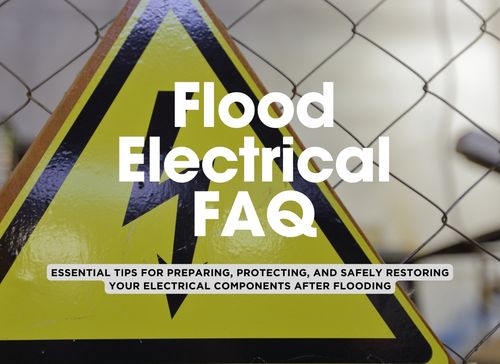Flooding can cause significant damage to electrical systems, posing serious safety risks for property owners. Knowing how to prepare, protect, and respond to electrical issues during and after a flood can make a crucial difference. This FAQ provides practical, actionable guidance on safeguarding your electrical components, identifying damage, and ensuring safe restoration of power, all while prioritizing your safety and minimizing future risks.
** This article provides general information for educational purposes only. It is not a substitute for professional advice. Always consult a licensed electrician for any electrical issues related to flooding, and follow local safety guidelines.
1. 🛡️ How Can I Protect My Electrical Systems Before a Flood?
Elevate and waterproof key electrical components to minimize flood damage risk.
Actionable Tip: Elevate electrical components like outlets, circuit breakers, and wiring above likely flood levels.
Additional Protection: Install waterproof covers on outlets and switches in flood-prone areas, such as basements. Consult an electrician to make any necessary adjustments to protect your system.
2. ⚠️ Should I Turn Off Power During a Flood Warning?
Yes, it’s safer to turn off the main power if flooding is expected.
Safety First: If a flood warning is issued, turn off the main breaker if it’s safe to access.
Utility Assistance: If it’s unsafe to reach the breaker, contact your utility provider to remotely shut off power to your home or building.
3. 🔌 What Electrical Components Are Most Vulnerable to Flooding?
Outlets, breakers, wiring, and appliances are highly susceptible to water damage in a flood.
Main Components at Risk: Electrical outlets, circuit breakers, wiring, and major appliances are particularly vulnerable.
Pro Insight: Even minor exposure can lead to corrosion or short circuits; elevate or waterproof these areas as a preventive measure.
4. 🔋 Is It Safe to Use Electrical Appliances After a Flood?
No, it’s essential to avoid using electrical appliances until they’ve been inspected by a qualified electrician.
Actionable Tip: Wait for an inspection to rule out hidden water damage.
Drying Time: Appliances like refrigerators, ovens, and washing machines need thorough drying and inspection to ensure safety before use.
5. 🛠️ How Do I Know If My Electrical System Needs to Be Replaced After Flooding?
Look for signs like corrosion on wires, tripping breakers, and visible water damage to determine if replacement is necessary.
Warning Signs: Corrosion on wires, frequent tripping of breakers, and visible damage indicate replacement may be needed.
Professional Advice: Consult a licensed electrician if you notice any of these signs after a flood.
6. 🔄 Can Electrical Panels Be Flood-Proofed?
Yes, electrical panels can be relocated or protected to reduce flood damage risk.
Actionable Tip: Elevate the electrical panel above flood levels, especially in flood-prone areas.
Additional Protection: Use waterproof enclosures around the panel if relocating isn’t an option, and consult an electrician for proper installation.
7. ⚡ What Should I Do if My Circuit Breakers Get Wet?
Avoid using the affected breakers and contact a professional immediately.
Safety First: Do not attempt to reset or touch any breakers that have been exposed to water.
Actionable Step: Call a licensed electrician to inspect and replace any water-damaged circuit breakers to avoid potential hazards.
8. 🧰 How Can I Safely Inspect Electrical Wiring After a Flood?
It’s crucial to have a professional inspect wiring after any flood exposure.
Actionable Tip: Avoid handling any exposed wiring yourself; instead, hire a licensed electrician to check for damage, corrosion, or other issues.
Key Warning: Damaged wiring can cause fires, so prioritize a professional inspection before restoring power.
9. 🔌 Are GFCI Outlets Effective in Flood-Prone Areas?
Yes, GFCI outlets provide an added layer of safety in areas susceptible to flooding.
Actionable Tip: Install GFCI outlets in flood-prone areas to quickly shut off power in case of water exposure.
Additional Benefit: These outlets are highly recommended in basements, garages, and near any water sources as an extra precaution.
10. 💡 What Are the Risks of Turning On Power Too Soon After a Flood?
Turning on power too soon can cause electrical shock, short circuits, or fires.
Actionable Tip: Ensure all systems have been thoroughly inspected and dried before restoring power.
Professional Help: Contact an electrician to assess the condition of the wiring, appliances, and outlets before turning the power back on.
11. 💧 How Can I Prevent Mold Growth in Electrical Systems After Flooding?
Dry affected areas thoroughly and ensure proper ventilation to reduce mold risks.
Actionable Tip: Use dehumidifiers and fans to dry out spaces with electrical components.
Additional Step: Have an electrician inspect for any hidden moisture in outlets, panels, and wiring to prevent mold and corrosion.
12. 🛠️ What Electrical Safety Precautions Should I Take During Flood Cleanup?
Wear protective gear and avoid standing water near electrical systems during cleanup.
Actionable Tip: Use rubber gloves and boots to prevent electrical shock.
Key Precaution: Do not operate electrical equipment or touch outlets and breakers until a professional has assessed their safety.
13. ☀️ Can Solar Panels or Backup Generators Be Used During a Flood?
It’s best to avoid using these power sources during flooding to minimize risks.
Actionable Tip: Disconnect any backup generators and secure solar systems if a flood is expected.
Important Note: Wait until the flood threat has passed and systems are inspected before reconnecting any power source.
14. 💸 Does Flood Insurance Cover Electrical System Repairs?
In most cases, flood insurance covers repairs for flood-damaged electrical systems.
Actionable Tip: Review your flood insurance policy to understand the coverage for electrical repairs.
Additional Insight: Ensure your policy includes electrical systems, as coverage can vary; contact your insurance provider if unsure.
15. 📞 When Should I Contact an Electrician After a Flood?
Contact an electrician immediately if any part of your electrical system has been exposed to water.
Actionable Tip: Schedule an inspection as soon as it’s safe to do so after a flood.
Priority Warning: Prompt professional assessment can help prevent hazards like shock, fire, or further system damage.
Flood recovery can be challenging, but taking the right steps to address your electrical systems helps protect both your property and those around it. From proactive preparations to post-flood inspections, each measure contributes to a safer, more resilient electrical setup. Remember, when in doubt, consult a licensed professional to handle any electrical concerns—prioritizing safety always pays off in the long run. Stay informed, stay prepared, and stay safe.



